Sally Challen case: The first Christmas with my Mum after she's freed from jail
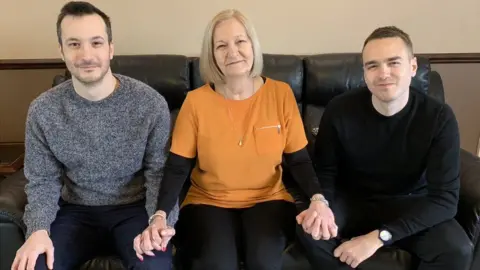 David Challen
David Challen"It's hard to put into words what Christmas together feels like as a family. We've been separated for so long.
"I think it's just being happy. For a very long time, we haven't been happy and we get to be happy again."
David Challen, 32, is looking forward to spending his first Christmas with his mum, Sally, in nearly a decade.
She spent nine years in prison for killing his dad Richard in 2010.
Sally was originally found guilty of murder but successfully appealed against her conviction.
She was released from jail in April and the charge was later reduced to manslaughter.
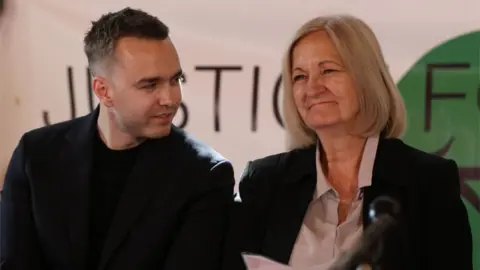 PA
PADavid says having his mum back in his life has been "amazing" and Christmas will be a "special time" for the family.
"I can't really put into words what it means - we didn't expect to be in the situation for another 10 years," he tells Radio 1 Newsbeat.
"That's how long she had left on her sentence. But it's been amazing to reunite as a family.
"It's obviously a struggle to let her be our mum again. It's a different dynamic, but we're happy to have Christmas together."
Sally suffered years of emotional abuse from her husband.
She was a victim of coercive control - which became a criminal offence in England and Wales in 2015.
Coercive control describes a pattern of behaviour by an abuser to harm, punish or frighten their victim.
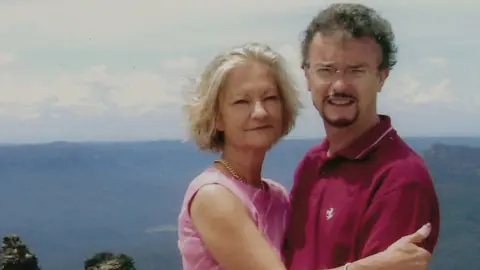
Sally's story is told in the BBC documentary, The Case of Sally Challen, which David took part in.
During the documentary, viewers see him visiting his dad's grave and he appears haunted when he speaks about what happened.
At one point he recalls how he cleaned up his dad's blood from the kitchen floor after police had finished their investigation.
"Dealing with the fact that my mother killed my father is difficult," he says. "She's returned to us as a mother but she killed our father.
"It's obviously a tragedy and something we never wished would happen, nor do we feel that it's justified her actions, but we at least understand them.
"My relationship with my mother is complicated, you can't dance around the fact that she is my mother and she's always been there for me, always supported me.
"And I've tried to do the same in return... my father's still my father to me, I still have a love for him that perhaps he might not deserve.
"But I also acknowledge the path that he chose in his life and I feel to an extent he knew the abuse that he was doing."
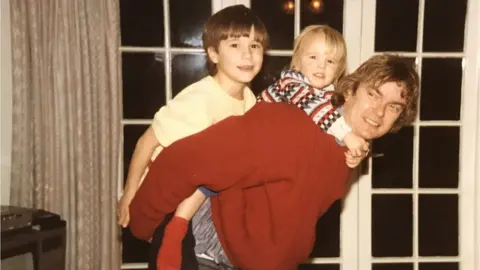 Family handout
Family handoutDavid says he hasn't spoken to his mum about what happened that much.
"I think only once did I say, 'Why did you have to kill him?' And that was just probably a couple of days afterwards," he says.
"But it wasn't a decision. It was a loss of control. I lived with her up until the days where it happened and I felt there was a snowball effect going on the background.
"But there's no way I could have known how far the abuse had extended."
The documentary reveals the full details of the emotional abuse his mum says she suffered at the hands of his dad.
Richard would call his wife horrible names, make rude remarks about her weight and clothes, and stop her talking to people. She also says he raped and humiliated her on multiple occasions.
Despite his mum's release from jail, David still believes coercive control isn't taken seriously enough.
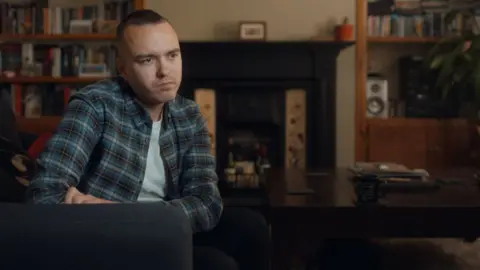
Figures from December last year found that the majority of cases involving controlling or coercive behaviour were dropped without a charge.
Data obtained by the BBC from 33 police forces in England and Wales, for January 2016 to July 2018, showed there were 7,034 arrests - but only 1,157 cases ended with someone being charged.
"Coercive control is not taken seriously enough in the criminal justice system," says David. "A lot of the cases that are put before the courts aren't understood.
"We're four years into this law being with us and the justice system still doesn't recognise victims of abuse because they don't have battered bones, they don't have broken faces.
"They are well put together women who have suffered abuse mentally, traumatically, for a significant period of time."
The Home Office told the BBC in 2018 that there had been 235 successful convictions since the law was introduced.
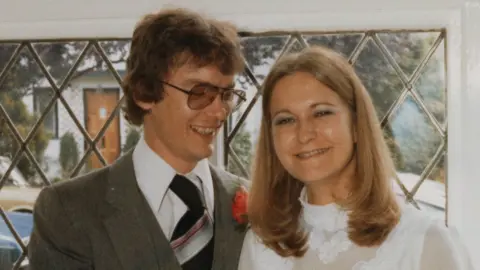
David hopes his mum's case will help other women who have suffered emotional abuse from a partner.
On Wednesday, Farieissia Martin, 26, was given the go-ahead to appeal her murder conviction.
She was jailed in 2015 for stabbing her ex-partner Kyle Farrell, 21, to death during a row at her home in Liverpool.
The Court of Appeal heard she was a victim of domestic abuse - which included physical violence, insults, and being cut off from family and friends.
"I think my mum's case has significantly shaped how we are understanding domestic abuse in this country," says David.
He says the Farieissia Martin case shows how society is starting to "grapple with the idea that you don't have to have broken bones to be a victim of domestic abuse."
"Mental trauma leaves an indelible mark on victims," he says.
David says anyone who feels they might be in a controlling relationship should keep a log of what's happening and confide in someone about it.
"It's more difficult in these cases because it doesn't leave marks. But this abuse shouldn't be tolerated.
"We're only getting the tip of the iceberg of how many people are affected by this type of abuse. The sooner we understand it, the sooner we can stop it."
The Case of Sally Challen is on BBC Two on Monday 9 December at 9pm
If you have been affected by any of the issues raised in this article help and advice is available here.


